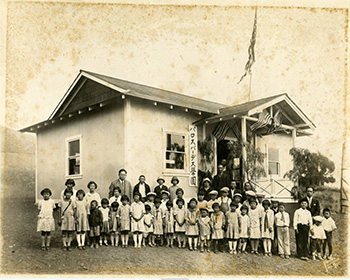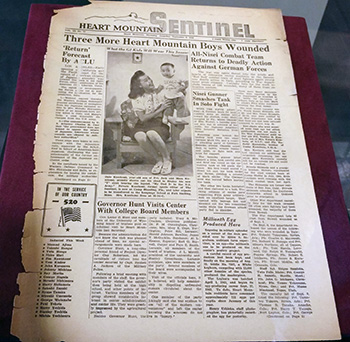
Executive Order 9066, signed by President Franklin D. Roosevelt on February 19, 1942, resulted in the forced removal of Japanese Americans living on the West Coast of the United States, most of whom were US citizens. Americans of Japanese descent were ultimately incarcerated in ten camps around the US administered by the War Relocation Authority (WRA). On December 18, 1944 the US Supreme Court ruled that loyal American citizens could not be detained without cause regardless of their cultural descent, and on January 2, 1945 the order was rescinded. As inmates were released, they were given $25 and a train ticket home. The Tule Lake Segregation Center, the last camp in operation, shut down on March 20, 1946.
On display in the center of the gallery are newspapers produced by inmates in the Gila River and Poston camps in Arizona, the Jerome and Rohwer camps in Arkansas, the Manzanar and Tule Lake camps in California, the Granada camp in Colorado, the Topaz camp in Utah, and the Heart Mountain camp in Wyoming. They provide first-hand information about the lives of the incarcerated via articles about mess halls and other communal spaces, school events, baseball leagues, dances, and more. Broader issues of interest in every camp are also prevalent, including the loyalty questionnaire used by the WRA to determine the "Americanness" of incarcerated adults, the subsequent segregation at Tule Lake of those deemed "disloyal" via the questionnaire, the status of Korematsu v. US, and information about Japanese Americans serving in the military overseas.

On display along the walls in the gallery are posters from the CSU Japanese American Digitization Project. As a part of the project, fifteen CSU campuses worked together to digitize letters, photographs, newsletters, and other materials that document the experiences of those imprisoned in camps during the war. Documents from Special Collections and Archives are just some of thousands included in the CSUJAD web portal: http://csujad.com/.
Assistive Services
Requests for accommodation services (e.g., sign language interpreters or transcribers) must be made at least five (5) business days in advance. Please e-mail library.event@csun.edu in advance of the event.
The Library Exhibit Gallery is open during Library open hours.

